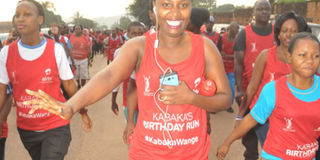Walk your way to fitness

Walking is a cardiovascular exercise as it helps to work out the heart and blood vessels. Photo by MICHAEL KAKUMIRIZI
During weekends, Joe Kizza often spares time to take long walks around his neighbourhood in Bweyogerere Town, Wakiso District.
The father of six has been doing this for the past five years. “I normally like walking during evening hours for two to three hours,” Kizza says.
“The beauty about this way of getting fit is that it is a simple routine. My outfit normally comprises a T-shirt, a pair of shorts and sneakers.” On some occasions, his children and wife also tag along.
Kizza is not the only one fond of walking as a way to exercise. Benjamin Opolot, a second year student at Kyambogo University, does the same. “I walk from campus to Kireka where my home is. It was strenuous at first because I would get exhausted quickly and my legs would ache but my body is now used,” Opolot says.
Since he never has time to do other exercises, the 25-year-old says walking is keeping his body fit.
Why is it important for one to walk?
Dr Ken Bagonza, a general practitioner at the Aga Khan University Hospital, says there are many advantages of walking, including improving blood circulation, which reduces conditions such as blood clots that usually come as a result of sedentary lifestyles (spending too much time seated).
Also, walking is a cardiovascular exercise as it helps to work out the heart and blood vessels. “It gives the heart an extra workload which is good for the body. Just like an athlete needs to train every day to keep in shape, the heart needs a similar setting,” Bagonza says.
He adds that walking helps to strengthen bones and joints as studies have showed the exercise increases bone density, especially for women who are in post-menopausal stage.
It boosts one’s mood, is a great mechanism for losing weight, improving sleeping patterns, reducing the risk of getting diseases such as hypertension and diabetes and for people already suffering from these conditions, walking helps to keep the diseases in check.
The two different forms of walking one can do include leisure walking (where one takes their time) and brisk walking where one almost breaks into a jog.
A sportsman insight
Moses Golola, a renowned Ugandan kickboxer, says walking is something sportsmen and women should embrace from time to time. “On some occasions, I walk for about 10 minutes before engaging in a particular gym session,” he says. “Walking is like a preparatory activity for a bigger task ahead.”
Daily walk can add 7 years to your life
Just 25 minutes of brisk walking a day or slow jogging can add up to seven years to your life, according to health experts. A research, presented last year at the European Society of Cardiology congress suggests that regular exercise can delay the ageing process.
The German study put men and women aged between 30 and 60 on a daily programme of exercise. They were selected because until then they had not been regular exercisers.
Alternatives
Andrew Mawejje Kyagulanyi, a fitness instructor, dancer and founder of In Motion Dance Studio at Forest Mall, Lugogo, says skipping the rope is one of the other cheaper options of exercising.
“I would recommend that one skips for 20 to 30 minutes. Breaks can be taken in between sessions. The beauty about this full-body work out is that it burns a lot of calories in a short time and improves flexibility of muscles,” he says.
For those who sit for long hours, the fitness instructor advices them to atleast stretch from time to time as it will relieve stress and relax tense muscles.




